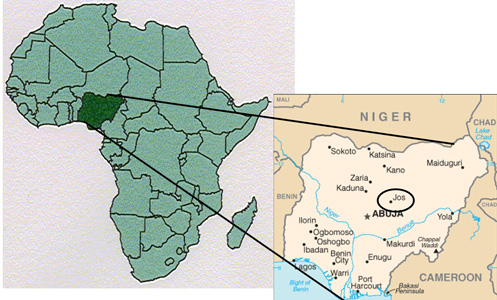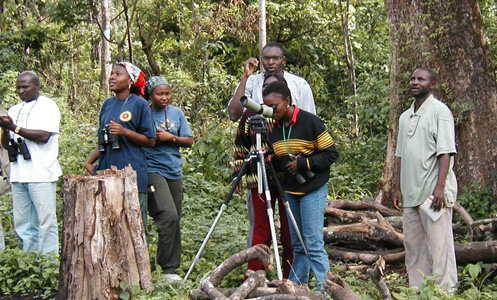ACT - Volume 9 Issue 1
<<< Back to Table of Contents
By Stephen Awoyemi and Mary Molokwu
Africa’s most populous country needed a reprieve for biodiversity conservation around the time A.P. Leventis Ornithological Research Institute (APLORI) was founded in 2002, as a premier institute of ornithological research and conservation training in West Africa. Deforestation, bush meat crisis and encroachment of protected areas were and still are issues concerning Nigeria’s biodiversity. However, APLORI has trained some 66 foot soldiers since 2003 and armed them with MSc degrees in Conservation Biology, to take up crucial responsibilities in the government, civil society and academia in Africa.
 |
The University of Jos (Unijos) is in Plateau State in central Nigeria. Credit: APLORI
|
Anastasios (Tasso) Paul Leventis, APLORI’s sole benefactor, is a businessman by vocation and conservationist by passion with a vision for environmentally sustainable approach to economic progress in West Africa. He has deep roots in Nigeria and founded APLORI as an autonomous field station of the University of Jos (UNIJOS), with a management committee made up of representatives from APLORI staff, the University of Jos, the Nigerian Conservation Foundation, the Leventis Conservation Foundation, Ahmadu Bello University, Zaria and University of St. Andrews, Scotland. The MSc program is taught at European Masters’ standard (as examined from faculty at the universities of Edinburgh, Lund, Ghent, Groningen and Oxford), and also serves as a resource centre for external Ph.D. projects, and postdoc research in need of a tropical base.
Tasso’s munificence has enabled APLORI pioneer conservation education in Nigeria and is an example of how such initiatives can redeem conservation efforts. Other NGOs with education programs include the
Tropical Biology Association (TBA), which has trained Nigerian students since 1997, with 48 alumni till date. Between 2010 and 2012, the TBA sponsored an additional 46 Nigerians for specialist training under its project titled “Developing research capacities among African environmental scientists”. The trainees were from over 19 organizations involved in conservation biology at various levels in government, academic and conservation NGOs in Nigeria. The Nigerian Conservation Foundation (NCF) was a partner of TBA in this venture. The
Earthwatch Institute field expeditions and
Conservation Leadership Programme (CLP) capacity building opportunities have also contributed to the growth of conservation biology education in Nigeria.
 |
APLORI students in the field. Photo credit: APLORI
|
APLORI sends out call for applications on its website, and in Nigerian newspapers in March each year. Selected applicants are invited for written and oral interviews. Only 7-8 students are selected for the course annually. Although a small intake, the APLORI alumni have made their mark as conservation practitioners in Africa. Ademola Ajagbe, one of the first graduates of APLORI is now Regional Science and IBA Program Manager and Team Leader of Conservation Action and Policy in BirdLife International, Kenya. Mary Molokwu, also from the first batch, went on to earn a Ph.D. from Lund University, Sweden, and is presently Technical Advisor Education & Research, Fauna and Flora International (FFI), and Project Manager at the Sapo Conservation Center (SCC), Liberia. Other APLORIans continue to secure research and academic positions across Africa and grant funding such as CLP Future Conservationist Awards, Rufford Small Grants and TBA scholarships. This is as good as it gets for conservation education in Africa.
Stephen Awoyemi is the President of the Africa Section of SCB.
Mary Molokwu is the Program Manager at the Sapo Conservation Center and Technical Advisor Education and Outreach, Fauna and Flora International (FCC), Liberia.

